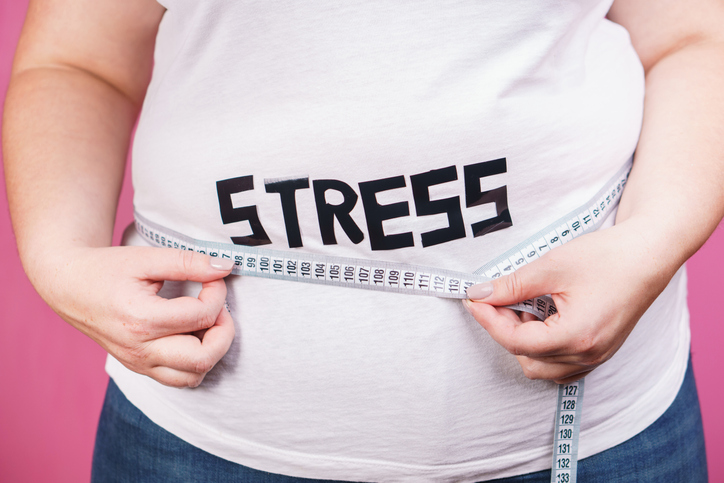How Stress Leads To Weight Gain
In the realm of weight management, a multitude of factors contribute to the often-frustrating challenge of achieving and maintaining a healthy body composition. While dietary choices and physical activity levels remain paramount, recent research has shed light on a frequently overlooked yet potent contributor to weight gain: chronic stress.
Imagine you’ve been diligently following a healthy diet and exercise routine, yet the numbers on the scale stubbornly refuse to budge. It must be frustrating for you but the culprit here is not your willpower, but your stress levels. It’s a shocking truth, chronic stress can be a major roadblock on your weight loss journey. So, how exactly does stress lead to weight gain? Let’s discover and find out the science behind this frustrating connection.
Stress Hormones and Weight Gain
Our bodies are hardwired to respond to stress through a primal mechanism known as fight-or-flight mechanism. When faced with a threat, our adrenal glands release a surge of cortisol, the stress hormone.
The cortisol hormone helps us in preparing for an immediate action by increasing blood sugar levels and diverting energy towards vital functions. However, in today’s fast-paced world, chronic stress keeps the cortisol levels elevated for extended periods. This has a domino effect on our weight management. The activation or cortisol hormone disrupts the delicate hormonal balance that regulates weight management in several ways:
Increased Appetite and Cravings:

Cortisol disrupts the delicate balance of hormones regulating hunger and satiety (feeling full). This leads to increased cravings for high-calorie, sugary, or fatty foods – a temporary source of comfort that can sabotage your healthy eating plans.
Slowed Metabolism:
Cortisol can potentially slow down metabolism, the rate at which your body burns calories. This means you burn fewer calories at rest, making it harder to lose weight or maintain a healthy weight.
Belly Fat Storage:
Research indicates a link between high cortisol levels and increased storage of visceral fat, the unhealthy fat that accumulates around your organs.This visceral fat is not just unsightly; it’s also associated with a higher risk of heart disease, type 2 diabetes, and other health problems.
Stress Beyond Hormones: The Behavioral Impact
The detrimental effects of stress extend beyond hormonal changes. Chronic stress can also lead to a cascade of unhealthy habits that contribute to weight gain. Stress can act as a double-edged sword, disrupting the very behaviors that promote healthy weight management.
Emotional Eating:
When stressed, the body craves comfort and familiarity. Often, these cravings translate into unhealthy food choices. Sugary treats, processed snacks, and fatty foods can provide a temporary emotional boost, but they lack the essential nutrients our bodies need to function optimally. This emotional eating can lead to overconsumption and hinder weight management efforts.
Sleep Deprivation:

Stress can significantly disrupt sleep patterns. When stressed, you may have difficulty falling asleep, staying asleep, or both. Inadequate sleep disrupts the body’s natural rhythm and hinders weight regulation. Sleep deprivation can lead to increased levels of the cortisol, creating a vicious cycle. Additionally, when sleep-deprived, you may experience increased cravings for sugary or high-carbohydrate foods for a quick energy boost. These choices can further disrupt your metabolism and contribute to weight gain.
Reduced Physical Activity:
Exercise is a well-known stress reliever and a cornerstone of weight management. However, when stressed, prioritizing exercise often falls by the wayside. You may feel too exhausted to hit the gym or simply lack the motivation to engage in physical activity. This lack of exercise can significantly hinder weight loss and contribute to weight gain. Exercise plays a crucial role in managing stress and promoting overall health. By reducing stress hormones and improving mood, exercise can help you make healthier food choices and feel more energized to tackle your day.
Effective Stress Management Strategies
Now that you understand the connection between stress and weight gain, the good news is that you can fight back! Here are some effective strategies to manage stress and keep your weight in check:
Identify Your Stressors:
The first step is to recognize what triggers your stress response. Is it work deadlines, financial burdens, or relationship issues? Once you identify the culprits, you can develop coping mechanisms.
Practice Relaxation Techniques:
Deep breathing exercises, meditation, progressive muscle relaxation, and mindfulness practices are powerful tools for calming the body and mind. These techniques can help regulate cortisol levels and mitigate stress-induced cravings.
Prioritize Quality Sleep:
Aim for 7-8 hours of quality sleep each night. Establishing a regular sleep schedule and practicing good sleep hygiene can significantly improve stress management and indirectly support weight regulation.
Regular Exercise:

Physical activity is a potent stress buster. Aim for at least 30 minutes of moderate-intensity exercise most days of the week. Exercise releases endorphins, the body’s natural feel-good chemicals, which can elevate mood and combat stress.
Nourish Your Body:
Eating a balanced diet rich in whole, unprocessed foods provides sustained energy and helps regulate blood sugar levels. Focus on fruits, vegetables, whole grains, lean protein, and healthy fats. This approach can help prevent stress-induced cravings and support overall health.
Maintain Social Connections:
Strong social connections provide emotional support and act as a buffer against stress. Spending time with loved ones, joining a support group, or connecting with a therapist can help you feel less overwhelmed and more equipped to manage stress in healthy ways.
Building Resilience:
Managing stress and its impact on weight is an ongoing process. There will be times when stress levels rise, and unhealthy habits become tempting. However, by incorporating these strategies into your daily routine, you can build resilience and empower yourself to make healthy choices, even during challenging times. Remember, consistency is key. The more you practice stress management techniques and prioritize healthy habits, the better equipped you’ll be to navigate life’s inevitable stressors and maintain a healthy weight.
Taking Control of Your Health
While stress may be a fact of life, it doesn’t have to dictate your weight or overall health. By understanding the connection between stress and weight gain and implementing these evidence-based strategies, you can take control of your stress response and optimize your weight management journey. LifeRx.md, a platform dedicated to empowering individuals on their path to optimal health and wellness, is here to support you every step of the way.
Our team of healthcare professionals, including board-certified physician and registered nurse practitioners understand the complex interplay between stress, weight management, and overall well-being. We are committed to providing personalized guidance and support tailored to your unique needs.
Whether you’re struggling with chronic stress, weight management challenges, or a combination of both, LifeRx.md can help. We offer a comprehensive suite of programs and resources to address weight management, and overall health. Our weight management programs provide personalized meal plans, ongoing support from registered health professionals, and guidance on developing sustainable lifestyle changes
Conclusion
Take charge of your health today. Learn more about our programs and schedule a consultation with a member of our healthcare team. Our consultation is minimally priced and would cost you around $49.
Let us help you break the cycle of stress-induced weight gain and empower you to achieve a healthier, happier you.
Remember, you are not alone in this journey. By taking an active role in managing stress and prioritizing your health, you can achieve a healthier and happier you.




















